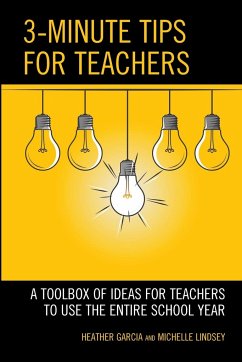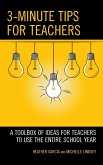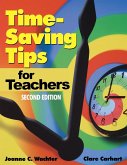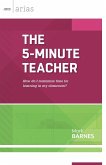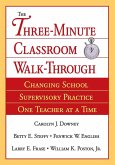Heather Garcia, Michelle Lindsey
3-Minute Tips for Teachers
A Toolbox of Ideas for Teachers to Use the Entire School Year
Heather Garcia, Michelle Lindsey
3-Minute Tips for Teachers
A Toolbox of Ideas for Teachers to Use the Entire School Year
- Broschiertes Buch
- Merkliste
- Auf die Merkliste
- Bewerten Bewerten
- Teilen
- Produkt teilen
- Produkterinnerung
- Produkterinnerung
This book is filled with quick tips to help teachers through the school year. It is designed for the busy teacher.
Andere Kunden interessierten sich auch für
![3-Minute Tips for Teachers 3-Minute Tips for Teachers]() Heather Garcia3-Minute Tips for Teachers84,99 €
Heather Garcia3-Minute Tips for Teachers84,99 €![Essential Tips for Classroom Success Essential Tips for Classroom Success]() Doug CampbellEssential Tips for Classroom Success64,99 €
Doug CampbellEssential Tips for Classroom Success64,99 €![Tips for Beginning Secondary Teachers Tips for Beginning Secondary Teachers]() Albert HoroszyTips for Beginning Secondary Teachers12,99 €
Albert HoroszyTips for Beginning Secondary Teachers12,99 €![Time-Saving Tips for Teachers Time-Saving Tips for Teachers]() Joanne C WachterTime-Saving Tips for Teachers35,99 €
Joanne C WachterTime-Saving Tips for Teachers35,99 €![The 5-Minute Teacher The 5-Minute Teacher]() Mark BarnesThe 5-Minute Teacher17,99 €
Mark BarnesThe 5-Minute Teacher17,99 €![The Smart Elementary School Teacher - Essential Classroom Management, Behavior, Discipline and Teaching Tips for Educators The Smart Elementary School Teacher - Essential Classroom Management, Behavior, Discipline and Teaching Tips for Educators]() Matilda WalshThe Smart Elementary School Teacher - Essential Classroom Management, Behavior, Discipline and Teaching Tips for Educators28,99 €
Matilda WalshThe Smart Elementary School Teacher - Essential Classroom Management, Behavior, Discipline and Teaching Tips for Educators28,99 €![Three-Minute Classroom Walk-Through Three-Minute Classroom Walk-Through]() Carolyn DowneyThree-Minute Classroom Walk-Through44,99 €
Carolyn DowneyThree-Minute Classroom Walk-Through44,99 €-
-
-
This book is filled with quick tips to help teachers through the school year. It is designed for the busy teacher.
Hinweis: Dieser Artikel kann nur an eine deutsche Lieferadresse ausgeliefert werden.
Hinweis: Dieser Artikel kann nur an eine deutsche Lieferadresse ausgeliefert werden.
Produktdetails
- Produktdetails
- Verlag: Rowman & Littlefield Publishers
- Seitenzahl: 186
- Erscheinungstermin: 6. Mai 2022
- Englisch
- Abmessung: 229mm x 152mm x 10mm
- Gewicht: 279g
- ISBN-13: 9781475864076
- ISBN-10: 1475864078
- Artikelnr.: 63158614
- Herstellerkennzeichnung
- Libri GmbH
- Europaallee 1
- 36244 Bad Hersfeld
- gpsr@libri.de
- Verlag: Rowman & Littlefield Publishers
- Seitenzahl: 186
- Erscheinungstermin: 6. Mai 2022
- Englisch
- Abmessung: 229mm x 152mm x 10mm
- Gewicht: 279g
- ISBN-13: 9781475864076
- ISBN-10: 1475864078
- Artikelnr.: 63158614
- Herstellerkennzeichnung
- Libri GmbH
- Europaallee 1
- 36244 Bad Hersfeld
- gpsr@libri.de
By Heather Garcia and Michelle Lindsey
Table of Contents
Preface
Introduction
Section 1: Preparing for the Start of School
1. Start Each Year Fresh
2. Know Your Standards Before the School Year Begins
3. Open House Night
4. Setting Up Your Room
5. Don't Spend Your Check Before You Earn It
6. Pre-School Nightmares
Section 2: Starting the School Year
7. Have Reasonable Expectations
8. Start Them Right Into Content In an Engaging Way
9. Ice Breakers Are a Death Sentence
10. Accessing Online Platforms
11. Battling Cell Phones
12. Find Out Who the Friends Are and Move Them
Section 3: Making Your Workload More Manageable
13. Starting the Morning
14. Checking Email
15. Lesson Planning
16. Photocopies
17. Keeping Up With the Grading
18. Build In Work Days
19. The Teacher Bag
20. Leaving for the Day
21. Stay Organized and Write Everything Down
Section 4: Establishing Student Routines
22. Collecting Student Work
23. Handing Back Student Work
24. Assigning Work
25. Behaviors That Need Routines
Section 5: Dealing With Administration
26. Don't Panic When They Call (Or Email)
27. Informal Walk-Throughs
28. Formal Evaluations
Section 6: Communicating With Students, Parents, and Administration
29. Answering Emails
30. Calling Home
31. Using Mass-Text Alert Systems
32. Parent Conferences
Section 7: Optimizing Interpersonal Skills
33. Treat Your Students Like Rational Humans
34. Keep the Rules Simple
35. The Chronically Absent
36. The Loud Kids
37. The Mean Kids
38. Choose Your Battles
Section 8: Thriving as an Educator
39. Choosing Your Work Tribe
40. Deciding Where You Eat Lunch
41. Know What You Can (and Cannot) Control
42. Using Your Time On Teacher Workdays
43. Ditch the Red Pen
44. What You Wear Matters
45. Good Teachers Are Always Students
46. Don't Let the Data Scare You
47. Polish Your Dragon Scales
Section 9: Increasing Student Engagement and Learning
48. Back to the Basics
49. Get em' Movin'
50. Show Students the Work Means Something
51. Make It Yourself
52. Student Choice
53. Let Your Kids Struggle
54. Holy Sh*% We Ended Early, Now What?
Section 10: Incorporating Reading and Writing
55. Reading Isn't Just for English Class
56. Get Them Writing
Section 11: Crossing the Digital Divide
57. Incorporating Technology
58. Let YouTube Help
59. Keep it PG
Section 12: Creating and Maintaining Your Work-Life Balance
60. Know Your Limits
61. Allow Yourself Time to Recharge
62. Know Your Contract
63. Censor Your Social Media
64. Don't Overshare With Your Students
Section 13: Ending the School Year
65. Don't Just Shove It All In a Box.
66. Have the Kids Help
67. Celebrate What Worked
68. Financially Surviving the Summer
Preface
Introduction
Section 1: Preparing for the Start of School
1. Start Each Year Fresh
2. Know Your Standards Before the School Year Begins
3. Open House Night
4. Setting Up Your Room
5. Don't Spend Your Check Before You Earn It
6. Pre-School Nightmares
Section 2: Starting the School Year
7. Have Reasonable Expectations
8. Start Them Right Into Content In an Engaging Way
9. Ice Breakers Are a Death Sentence
10. Accessing Online Platforms
11. Battling Cell Phones
12. Find Out Who the Friends Are and Move Them
Section 3: Making Your Workload More Manageable
13. Starting the Morning
14. Checking Email
15. Lesson Planning
16. Photocopies
17. Keeping Up With the Grading
18. Build In Work Days
19. The Teacher Bag
20. Leaving for the Day
21. Stay Organized and Write Everything Down
Section 4: Establishing Student Routines
22. Collecting Student Work
23. Handing Back Student Work
24. Assigning Work
25. Behaviors That Need Routines
Section 5: Dealing With Administration
26. Don't Panic When They Call (Or Email)
27. Informal Walk-Throughs
28. Formal Evaluations
Section 6: Communicating With Students, Parents, and Administration
29. Answering Emails
30. Calling Home
31. Using Mass-Text Alert Systems
32. Parent Conferences
Section 7: Optimizing Interpersonal Skills
33. Treat Your Students Like Rational Humans
34. Keep the Rules Simple
35. The Chronically Absent
36. The Loud Kids
37. The Mean Kids
38. Choose Your Battles
Section 8: Thriving as an Educator
39. Choosing Your Work Tribe
40. Deciding Where You Eat Lunch
41. Know What You Can (and Cannot) Control
42. Using Your Time On Teacher Workdays
43. Ditch the Red Pen
44. What You Wear Matters
45. Good Teachers Are Always Students
46. Don't Let the Data Scare You
47. Polish Your Dragon Scales
Section 9: Increasing Student Engagement and Learning
48. Back to the Basics
49. Get em' Movin'
50. Show Students the Work Means Something
51. Make It Yourself
52. Student Choice
53. Let Your Kids Struggle
54. Holy Sh*% We Ended Early, Now What?
Section 10: Incorporating Reading and Writing
55. Reading Isn't Just for English Class
56. Get Them Writing
Section 11: Crossing the Digital Divide
57. Incorporating Technology
58. Let YouTube Help
59. Keep it PG
Section 12: Creating and Maintaining Your Work-Life Balance
60. Know Your Limits
61. Allow Yourself Time to Recharge
62. Know Your Contract
63. Censor Your Social Media
64. Don't Overshare With Your Students
Section 13: Ending the School Year
65. Don't Just Shove It All In a Box.
66. Have the Kids Help
67. Celebrate What Worked
68. Financially Surviving the Summer
Table of Contents
Preface
Introduction
Section 1: Preparing for the Start of School
1. Start Each Year Fresh
2. Know Your Standards Before the School Year Begins
3. Open House Night
4. Setting Up Your Room
5. Don't Spend Your Check Before You Earn It
6. Pre-School Nightmares
Section 2: Starting the School Year
7. Have Reasonable Expectations
8. Start Them Right Into Content In an Engaging Way
9. Ice Breakers Are a Death Sentence
10. Accessing Online Platforms
11. Battling Cell Phones
12. Find Out Who the Friends Are and Move Them
Section 3: Making Your Workload More Manageable
13. Starting the Morning
14. Checking Email
15. Lesson Planning
16. Photocopies
17. Keeping Up With the Grading
18. Build In Work Days
19. The Teacher Bag
20. Leaving for the Day
21. Stay Organized and Write Everything Down
Section 4: Establishing Student Routines
22. Collecting Student Work
23. Handing Back Student Work
24. Assigning Work
25. Behaviors That Need Routines
Section 5: Dealing With Administration
26. Don't Panic When They Call (Or Email)
27. Informal Walk-Throughs
28. Formal Evaluations
Section 6: Communicating With Students, Parents, and Administration
29. Answering Emails
30. Calling Home
31. Using Mass-Text Alert Systems
32. Parent Conferences
Section 7: Optimizing Interpersonal Skills
33. Treat Your Students Like Rational Humans
34. Keep the Rules Simple
35. The Chronically Absent
36. The Loud Kids
37. The Mean Kids
38. Choose Your Battles
Section 8: Thriving as an Educator
39. Choosing Your Work Tribe
40. Deciding Where You Eat Lunch
41. Know What You Can (and Cannot) Control
42. Using Your Time On Teacher Workdays
43. Ditch the Red Pen
44. What You Wear Matters
45. Good Teachers Are Always Students
46. Don't Let the Data Scare You
47. Polish Your Dragon Scales
Section 9: Increasing Student Engagement and Learning
48. Back to the Basics
49. Get em' Movin'
50. Show Students the Work Means Something
51. Make It Yourself
52. Student Choice
53. Let Your Kids Struggle
54. Holy Sh*% We Ended Early, Now What?
Section 10: Incorporating Reading and Writing
55. Reading Isn't Just for English Class
56. Get Them Writing
Section 11: Crossing the Digital Divide
57. Incorporating Technology
58. Let YouTube Help
59. Keep it PG
Section 12: Creating and Maintaining Your Work-Life Balance
60. Know Your Limits
61. Allow Yourself Time to Recharge
62. Know Your Contract
63. Censor Your Social Media
64. Don't Overshare With Your Students
Section 13: Ending the School Year
65. Don't Just Shove It All In a Box.
66. Have the Kids Help
67. Celebrate What Worked
68. Financially Surviving the Summer
Preface
Introduction
Section 1: Preparing for the Start of School
1. Start Each Year Fresh
2. Know Your Standards Before the School Year Begins
3. Open House Night
4. Setting Up Your Room
5. Don't Spend Your Check Before You Earn It
6. Pre-School Nightmares
Section 2: Starting the School Year
7. Have Reasonable Expectations
8. Start Them Right Into Content In an Engaging Way
9. Ice Breakers Are a Death Sentence
10. Accessing Online Platforms
11. Battling Cell Phones
12. Find Out Who the Friends Are and Move Them
Section 3: Making Your Workload More Manageable
13. Starting the Morning
14. Checking Email
15. Lesson Planning
16. Photocopies
17. Keeping Up With the Grading
18. Build In Work Days
19. The Teacher Bag
20. Leaving for the Day
21. Stay Organized and Write Everything Down
Section 4: Establishing Student Routines
22. Collecting Student Work
23. Handing Back Student Work
24. Assigning Work
25. Behaviors That Need Routines
Section 5: Dealing With Administration
26. Don't Panic When They Call (Or Email)
27. Informal Walk-Throughs
28. Formal Evaluations
Section 6: Communicating With Students, Parents, and Administration
29. Answering Emails
30. Calling Home
31. Using Mass-Text Alert Systems
32. Parent Conferences
Section 7: Optimizing Interpersonal Skills
33. Treat Your Students Like Rational Humans
34. Keep the Rules Simple
35. The Chronically Absent
36. The Loud Kids
37. The Mean Kids
38. Choose Your Battles
Section 8: Thriving as an Educator
39. Choosing Your Work Tribe
40. Deciding Where You Eat Lunch
41. Know What You Can (and Cannot) Control
42. Using Your Time On Teacher Workdays
43. Ditch the Red Pen
44. What You Wear Matters
45. Good Teachers Are Always Students
46. Don't Let the Data Scare You
47. Polish Your Dragon Scales
Section 9: Increasing Student Engagement and Learning
48. Back to the Basics
49. Get em' Movin'
50. Show Students the Work Means Something
51. Make It Yourself
52. Student Choice
53. Let Your Kids Struggle
54. Holy Sh*% We Ended Early, Now What?
Section 10: Incorporating Reading and Writing
55. Reading Isn't Just for English Class
56. Get Them Writing
Section 11: Crossing the Digital Divide
57. Incorporating Technology
58. Let YouTube Help
59. Keep it PG
Section 12: Creating and Maintaining Your Work-Life Balance
60. Know Your Limits
61. Allow Yourself Time to Recharge
62. Know Your Contract
63. Censor Your Social Media
64. Don't Overshare With Your Students
Section 13: Ending the School Year
65. Don't Just Shove It All In a Box.
66. Have the Kids Help
67. Celebrate What Worked
68. Financially Surviving the Summer

